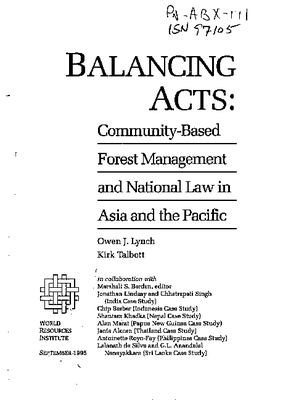Balancing acts: Community based forest management and national law in Asia and the Pacific
SUMMARY: This WRI study derives from a comparative review of forest management in India, Nepal, the Philippines, Thailand, Sri Lanka, and Indonesia. The document examines the legal, historical and cultural settings under which CBNFM has been implemented in these countries. Lessons are also included from Papua New Guinea, which has community land tenure and was not colonized or exploited as extensively as other countries, but has also suffered forest loss.Three conclusions were drawn from the cross-country review, notably: Government level ownership and management is not sustaining forests; Forest management could be improved most by legal frameworks that secure private, community-based land tenure;Current local authority/institutions may not be sufficient to balance responsibilities if legal land tenure is disseminated to local groups. The authors note that social inequity and persistent misrepresentations of rural people contribute to the notion that community forestry according to local customs is not desirable. The authors suggest that CBNFM initiatives would benefit from better education of local resource users, increased security of land tenure, and government support of communities when they defend and sustainably manage their forests. Government-sponsored community forestry programs based on grants that can be cancelled are not effective. Rather, governments should recognize community-based tenure as if it were private ownership although the government should intervene when sustainable management is not being practiced. Zoning laws and tax levies could be altered to support this. Local groups should be adequately notified and informed as these changes take place.
https://biodiversitylinks.org/library/resources/rmp/library/content/tools/biodiversity-support-program/copy_of_cbnfm/USAID-BDB-cd-2-data/balancing-acts-community-based-forest-management-and-national-law-in-asia-and-the-pacific/view
https://biodiversitylinks.org/library/resources/rmp/library/content/tools/biodiversity-support-program/copy_of_cbnfm/USAID-BDB-cd-2-data/balancing-acts-community-based-forest-management-and-national-law-in-asia-and-the-pacific/@@download/image/image.png
File
Balancing acts: Community based forest management and national law in Asia and the Pacific
Author(s):
Owen J. Lynch,
Kirk Talbott
Publication Date: 1995
Location: Asia and the Pacific
DOWNLOAD FILE
SUMMARY: This WRI study derives from a comparative review of forest management in India, Nepal, the Philippines, Thailand, Sri Lanka, and Indonesia. The document examines the legal, historical and cultural settings under which CBNFM has been implemented in these countries. Lessons are also included from Papua New Guinea, which has community land tenure and was not colonized or exploited as extensively as other countries, but has also suffered forest loss.Three conclusions were drawn from the cross-country review, notably: Government level ownership and management is not sustaining forests; Forest management could be improved most by legal frameworks that secure private, community-based land tenure;Current local authority/institutions may not be sufficient to balance responsibilities if legal land tenure is disseminated to local groups. The authors note that social inequity and persistent misrepresentations of rural people contribute to the notion that community forestry according to local customs is not desirable. The authors suggest that CBNFM initiatives would benefit from better education of local resource users, increased security of land tenure, and government support of communities when they defend and sustainably manage their forests. Government-sponsored community forestry programs based on grants that can be cancelled are not effective. Rather, governments should recognize community-based tenure as if it were private ownership although the government should intervene when sustainable management is not being practiced. Zoning laws and tax levies could be altered to support this. Local groups should be adequately notified and informed as these changes take place.



